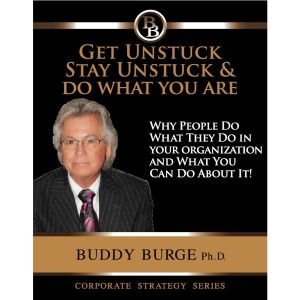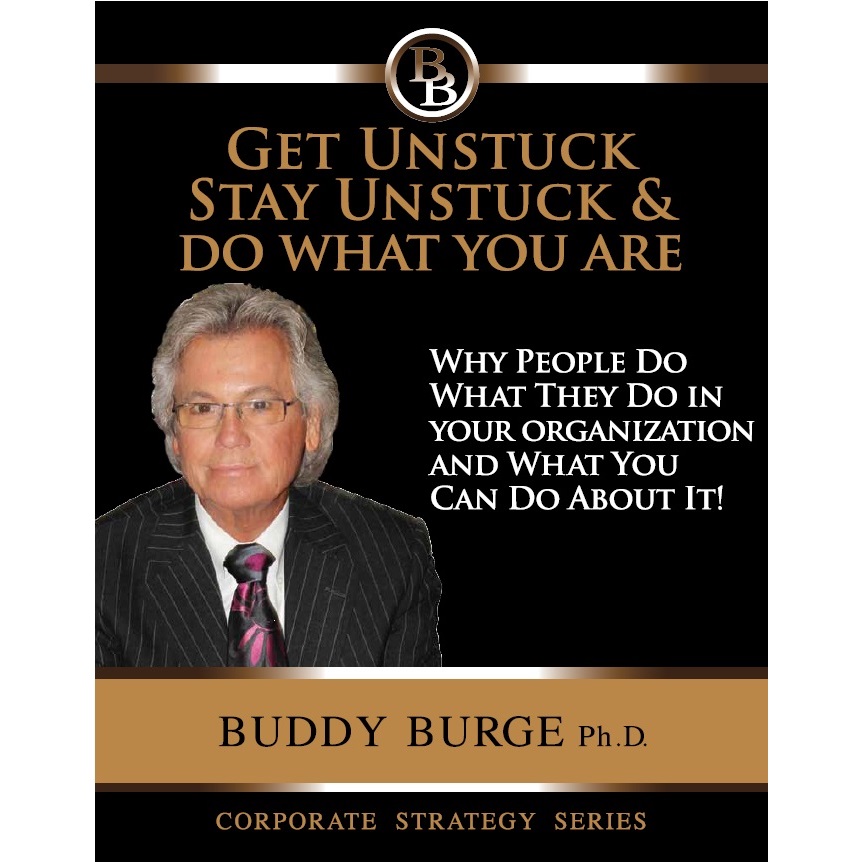The following Excerpt is Taken from “Get Unstuck, Stay Unstuck and do What you are”
Self Mastery Strategy One: What Do You Do When You Don’t Want To – Five Steps
When you need to decide whether or how to do something, there is a five step process.
![CropperCapture[611]](http://buddyburge.com/wp-content/uploads/2014/04/CropperCapture611-300x188.png)
Those steps are:
- Eliminate
- Automate
- Delegate
- Calibrate
- Celebrate
1. Eliminate:
The first question one must ask is, do I need to do this at all?
If the task needs to be done, then we proceed to step number two.
2. Automate: Develop a (Support) System:
That compensates for and complements your weakness, that is the overdoing of your strength
3. Delegate: Partner with (hire) or someone:
Pay or find someone who is opposite to you and likes to do or is good at what you don’t like to do.
On this option, it is good to ask:
1. Can this be done in-house?
2. How much control will I/we lose?
3. Can I live with the loss of control?
4. How will this change affect my customers?
4. Calibrate: Make your weakness (the opposite of what you love to do) a skill:
We need to recalibrate and develop a skill that approximates or looks like a natural talent when the task at hand requires it.
Then make sure you revert or go back to your default position, what you love to do and “celebrate” that you are able “to do what you are.”
The thinking process looks like the following:
- Eliminate
- Automate
- Delegate
- Calibrate
This is Self Mastery Strategy Number Twelve that I have written about in “Get Unstuck, Stay Unstuck and do What you are”; the Ikea Effect, to not only do what you love (this is what I mean by “doing what you are” which should always be our first choice) but to love what you do.
5. Celebrate
Now you can go back to being who and doing what you are.
What does Calibrate Mean?
The trickiest of these five steps is to Calibrate.
Webster defines calibrate as to “change measuring equipment to make it accurate; to check or change a piece of equipment used for measuring things in order to make it accurate.”
To make regular marks on measuring equipment; to make a series of regular marks on a piece of equipment for measuring things
To ensure the accuracy of something; measurements to test and adjust the accuracy of a measuring instrument or process
By calibrate I mean to think and organize oneself differently; to reorganize oneself (our point of view, mindset and strategy, action).
In the context we are discussing, calibrate means “I need to measure, look at this thing differently and likely learn how to do it myself.”
“I have tried to eliminate, automate, delegate, all to no effect.
I have to do this task and be good at it; that is to say, develop a skill where there is no talent.
Like pushing a rock up a hill, I might rather stick a needle in my eyeball than have to do this particular thing but it needs to be done, by me.
How do I do that when I don’t want to?
What do I do when I don’t want to?”
Talent and Skill: the Difference
Talent, the way we naturally think and respond that works so well for us, is what god, life or nature gives you.
Skill, what we learn, is what you give yourself.
Option one and/or two is the best choice.
Why, because you are doing what you are, which is what you should do.
In other words, if at all possible, eliminate your inefficiencies/weaknesses and multiply/proliferate your strengths.
But what if you feel you have no choice, you need to choose option three, learn to facilitate your executive team (meetings) better etc.
How Do You Learn A Needed Skill? What Should You Do?
With Jenna, a very people centered but not necessarily task driven manager tends to be a little too affiliative.
For instance if Jenna decides that she cannot avoid the need to be more decisive, so she chooses option three.
While Jenna must always build on her core strength her biological predisposition, and talent (her affiliative nature), it would really help her know how to play all three games when the task at hand requires her to so do.
Jenna, instead of overdoing the team aspects of leadership, should consciously dial back on team building, which would then make it easier for her to drive individual goals and accountability.
She Should Be More about Calibrating the Dial Back On a Continuum of Behavioral Choices
In this case, it would help so much if she slowed down on the team focus (Basketball: Are we playing the right game?) to individual focus (Baseball).
Much of the managerially generated complexity in organizations comes from overdone behaviors, from too much of a good thing and the associated avoidance of its opposite.
This predisposition is difficult to see because leaders and managers tend to think they are doing the right thing in the right way.
But too much of one right thing, coupled with too little of its opposite, is often wrong.
![CropperCapture[612]](http://buddyburge.com/wp-content/uploads/2014/04/CropperCapture612-300x242.png)
To Make that Happen, Do the Following
- Analyze, know yourself and admit where you are instinctual and that you are problem one.
- Realize that this happens to everyone; the smarts ones are the ones who get it!
- Acknowledge your blind spot and detail its’ negative effect on the group.
- Stop overdoing strengths, and avoiding areas of discomfort.
- Consciously dial back on what you like to do and are good at, which will make it easier for you to do what you do not like to do and are likely not very good at doing.
- Keep getting feedback on how you are doing and ask people to help you.
For more on this topic, we recommend the following | |
 | Get Unstuck, Stay Unstuck |


